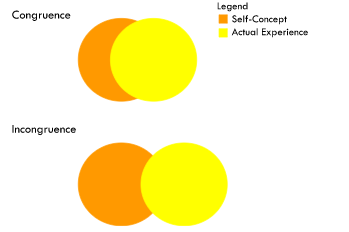Theories of Personality: Carl Rogers
History
- Born in 1902 in Illinois – Midwestern conservative religious upbringing
- Started training for the ministry but rejected it as too rigid, but those values evident in his approach
- A key advocate of humanistic psychology
Phenomenological Perspective
- Life’s Master Motive: The Actualizing Tendency
- Primary motive is to actualize, maintain, or enhance
- To become the best self that their inherited natures will allow them to be
- Organismic Value Process: monitoring system of individuals to distinguish experiences that promotes or hinders actualization
- Roger’s Phenomenological Position
- What is real to an individual is that which exists within the person’s frame of reference
- Here and Now (ahistorical)
- To understand why a person behaves in such a way, we do not need to dig into his or her past instead we must understand the person’s relationship to the environment as he now exists and perceives it
- The Self-Concept
- Composed of the real self and the ideal self and our goal is to narrow the gap between the two (actualization)
- Genuineness and Authenticity: being true to yourself and others by being aware of own feelings rather than presenting an outward facade
Congruence and Incongruence
Congruence
- Self-concept meshes well with actual experience (some incongruence is probably unavoidable)
Incongruence
- Self-concept does not mesh well with actual experience

Development
- Depends on which of the following does the person receive from SDs
Conditional Positive Regard
- Acceptance of some or rejection of other behavior
- Conditions of worth:
- Evaluative notions concerning which behaviors are worthy or unworthy
- Self-concept thus socially determined and, as a result, is incongruent with the inherent potentialities
- To keep incongruence repressed defenses are used
Unconditional Positive Regard
- Basic, complete acceptance or respect
- Self-concept reflects all that there is in the inherent potentialities
- Self is considered congruent with potentialities
2 Basic Human Needs
- Self-Actualization: the need to fulfill all of one’s potential
- Positive Regard: the need to receive acceptance, respect, and affection from others
- Often comes with conditions attached
The Fully Functioning Person (Going Towards Actualization)
- Openness to Experience
- Open to responsibilities; embraces human experiences such as love, pain, suffering, forgiveness, compassion, etc.
- Existential Living
- Every experience is a new experience and giving your best anytime (living the day as if it is your last)
- Organismic Trusting
- Doing what you feel is right, not what is right or what society thinks is right
- Experiential Freedom
- Capacity to choose and to be free
- Creativity
- Productive (to self and culture)
- Accurate Empathy (Unconditional Positive Regard)
- The only way to have accurate empathy is to accept the other person without judgment
Conditional in Person-Centered Therapy
- Direction comes from the client rather than from the therapist’s insights, so referred to as nondirective therapy, later client-centered therapy
- Empathy
- Congruence or genuineness
- Unconditional positive regard